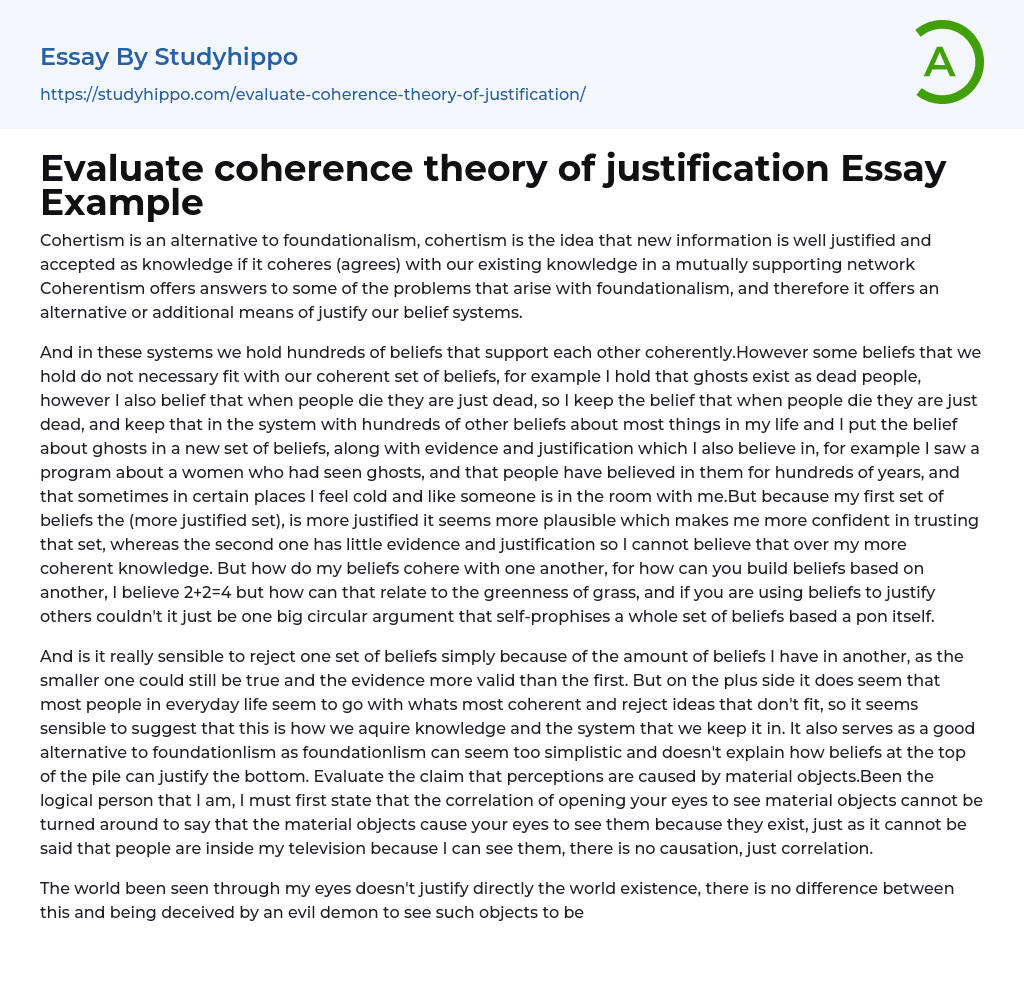Coherentism proposes an alternative approach to foundationalism. It suggests that if new information is consistent with our existing knowledge, it can be accepted as knowledge in a mutually supportive network. This perspective addresses some of the challenges associated with foundationalism, providing an additional means of justifying our belief systems.
Within our belief systems, we maintain a consistent set of interconnected beliefs. However, certain beliefs may not align with our established set, such as my belief in the existence of ghosts as deceased individuals versus the idea that death means finality. As a result, I reserve my belief in ghosts as a separate set of beliefs, justified by evidence such as personal experiences and historical accounts. Nonetheless, my primary set of beliefs, which are better substantiated, remains more plausible and instills greater confide
...nce. Despite this, the process of justifying beliefs can lead to circular reasoning within a self-referencing system.
Rejecting a set of beliefs solely based on the abundance of beliefs in another may not always be a sensible approach. There is the possibility that the smaller set of beliefs is true with more valid evidence than the first. However, in everyday life, people tend to follow coherence and reject ideas that do not fit, which can be a practical way to acquire knowledge and organize it. This approach also provides an alternative to foundationalism, which may lack complexity and fail to explain how top-level beliefs justify bottom-level beliefs. When evaluating the claim that material objects cause perceptions, it is important to note that opening one's eyes to see objects does not necessarily mean that the objects cause the eyes to see them. This association is merel
correlation and not causation. To illustrate this point, seeing people on a television does not mean they are inside it.
Descartes posited that relying solely on one's visual perception to prove the existence of the world is inadequate as it could be an illusion generated by a malevolent demon. Other philosophers, such as G.E. Moore, argue that their hands exist based on their sensory experiences; nonetheless, this does not necessarily guarantee their actual existence. While certain truths, like 2+2=4, can be deemed indubitable or unquestionable, claims such as "I possess two hands" are based on posteriori knowledge and thus require verification of their truth value. Simply perceiving the world is insufficient evidence for its existence since it could potentially be a hologram or a creation of an evil demon. As a result, asserting knowledge about the world's existence without further reasoning may not qualify as a valid philosophical statement.
- Acceptance essays
- Age Of Enlightenment essays
- Child Observation essays
- Confucianism essays
- Conscience essays
- Critical Reflection essays
- Destiny essays
- Determinism essays
- Empiricism essays
- Environmentalism essays
- Epistemology essays
- Ethics essays
- Ethos essays
- Existence essays
- Existentialism essays
- Fate essays
- Free Will essays
- Functionalism essays
- Future essays
- Good And Evil essays
- Human Nature essays
- Individualism essays
- Meaning Of Life essays
- Metaphysics essays
- Natural Law essays
- Personal Philosophy essays
- Philosophers essays
- Philosophy Of Life essays
- Political Philosophy essays
- Pragmatism essays
- Reality essays
- Relativism essays
- Teaching Philosophy essays
- Time essays
- Transcendentalism essays
- Truth essays
- Utilitarianism essays
- Activity essays
- Believe essays
- Comfort Zone essays
- Dance essays
- Fashion essays
- Fishing essays
- Fitness essays
- Freedom essays
- Habits essays
- Healthy Lifestyle essays
- Hobby essays
- Hunting essays
- Interests essays




